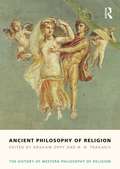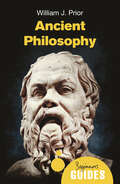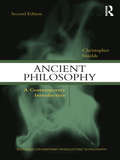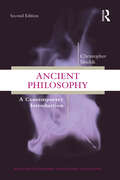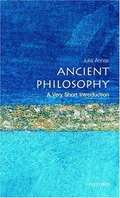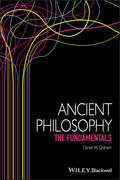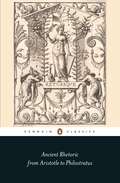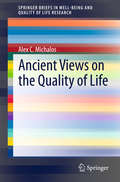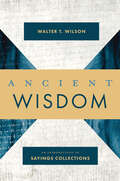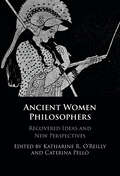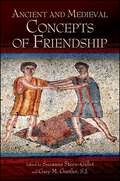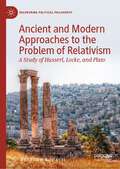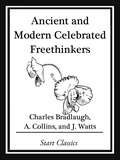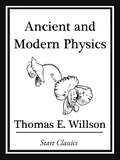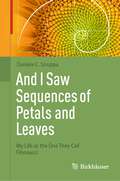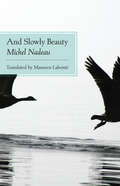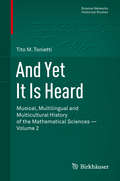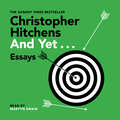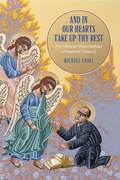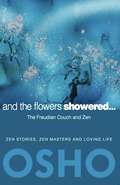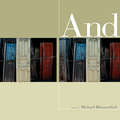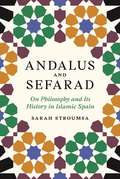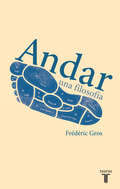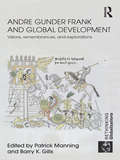- Table View
- List View
Ancient Philosophical Poetics
by Malcolm HeathWhat is poetry? Why do human beings produce and consume it? What effects does it have on them? Can it give them insight into truth, or is it dangerously misleading? This book is a wide-ranging study of the very varied answers which ancient philosophers gave to such questions. An extended discussion of Plato's Republic shows how the two discussions of poetry are integrated with each other and with the dialogue's central themes. Aristotle's Poetics is read in the context of his understanding of poetry as a natural human behaviour and an intrinsically valuable component of a good human life. Two chapters trace the development of the later Platonist tradition from Plutarch to Plotinus, Longinus and Porphyry, exploring its intellectual debts to Epicurean, allegorical and Stoic approaches to poetry. It will be essential reading for classicists as well as ancient philosophers and modern philosophers of art and aesthetics.
Ancient Philosophy of Religion: The History of Western Philosophy of Religion, Volume 1
by Graham Oppy N. N. TrakakisThe origins of the Western philosophical tradition lie in the ancient Greco-Roman world. This volume provides a unique insight into the life and writings of a diverse group of philosophers in antiquity and presents the latest thinking on their views on God, the gods, religious belief and practice. Beginning with the 'pre-Socratics', the volume then explores the influential contributions made to the Western philosophy of religion by the three towering figures of Socrates, Plato and Aristotle. The chapters that follow cover the the leading philosophers of the major schools of the ancient world - Epicureanism, Stoicism, Neoplatonism and the early Christian Church. "Ancient Philosophy of Religion" will be of interest to scholars and students of Philosophy, Classics and Religion, while remaining accessible to any interested in the rich cultural heritage of ancient religious thought.
Ancient Philosophy: A Beginner's Guide (Beginner's Guides)
by William J. PriorBefore Socrates, philosophers sought explanations for naturally-occurring phenomena from earthquakes and eclipses to the existence of the entire cosmos. But the Socratic era saw a great shift towards questions much closer to the human experience. Philosophers became concerned with life and how to live it, the nature of knowledge and reality, the soul and its relation to the body, and the place of human beings in the universe.Ancient philosophy expert, William J. Prior elegantly guides readers through philosophy's formative years, from the pre-Socratic to the Stoic and Epicurean schools. Combining a general discussion of movements with analysis of key passages from ancient texts, it is an enthralling insight into the evolution of philosophy and how the great thinkers of centuries gone by can still send our minds reeling today. For students and interested readers alike, this is the ideal introduction, opening the door to the philosophy's classic works and fascinating in its own right.
Ancient Philosophy: A Contemporary Introduction (Routledge Contemporary Introductions to Philosophy)
by Christopher ShieldsIn this re-titled and substantially revised update of his Classical Philosophy (2003), Christopher Shields expands his coverage to include the Hellenistic era, and now offers an introduction to more than 1,000 years of ancient philosophy. From Thales and other Pre-Socratics through Socrates, Plato, and Aristotle, and on to Epicureanism, Stoicism, and Scepticism, Ancient Philosophy traces the important connections between these periods and individuals without losing sight of the novelties and dynamics unique to each. The coverage of Plato and Aristotle also has been expanded. It now includes, for example, updated coverage of Plato's allegories of the cave and the divided line and the metaphor of the sun as well as features of Plato's epistemology. Shields also adds new discussion on Aristotle's theory of virtue and his approach to the Socratic problem of akrasia, or weakness of will. In terms of its structure, Ancient Philosophy is presented so that each philosophical position receives: (1) a brief introduction, (2) a sympathetic review of its principal motivations and primary supporting arguments, and (3) a short assessment, inviting readers to evaluate its plausibility. The result is a book that brings the ancient arguments to life, making the introduction truly contemporary. It will serve as both a first stop and a well visited resource for any student of the subject. Ancient Philosophy offers a vivid picture of the ideas that flourished at philosophy's long birth and considers their relevance, both to the historical development of the Western philosophical tradition, and to philosophy today.
Ancient Philosophy: A Contemporary Introduction (Routledge Contemporary Introductions to Philosophy)
by Christopher ShieldsIn Ancient Philosophy (2012), Christopher Shields expanded on the coverage of Socrates, Plato, and Aristotle in his earlier book, Classical Philosophy (2003), to include the philosophy of the Hellenistic era. In this new edition (2023), Shields reaches even further to include material on Neoplatonism and on Augustine and Proclus, capturing—from Thales of Miletus to the end of the sixth century CE—all of what might be called ancient philosophy. It traces the important connections between the periods and individuals of more than 1,200 years of philosophy’s history without losing sight of the novelties and dynamics unique to each. The coverage of the Presocratics, Sophists, Plato, and Stoicism has also been expanded so as to highlight Plato’s responses to the Sophistic movement in the development of his Theory of Forms. And, finally, a valuable companion volume, with Shields’s focused translations of the important sources referred to in Ancient Philosophy, Second Edition, will soon be published, obviating the need for a massive anthology of discordant voices. Ancient Philosophy, Second Edition, retains its helpful structure: each philosophical position receives: (1) a brief introduction, (2) a sympathetic review of its principal motivations and primary supporting arguments, and (3) a short assessment, inviting readers to evaluate its plausibility. The result is a book that brings the ancient arguments to life, making the introduction truly contemporary. It continues to serve as both a first stop and a well-visited resource for any student of the subject. Key updates in the second edition Extends the range of coverage well into the sixth century CE by offering a new chapter on Neoplatonism and early Christian philosophy, featuring discussions of Proclus and Augustine. Explains the conflicts between Plato and the Sophists by highlighting their approaches to rhetoric as an instrument of persuasion, offering a helpful explanation of two senses of argument. Includes new coverage of Plato’s argument from the Simplicity of the Soul, Argument from Affinity, and Argument against Rhetoric. Includes coverage of Aristotle’s political naturalism . May be used with a soon-to-be-published companion volume of primary source material, all of it translated by Christopher Shields specifically for the reader of this Second Edition.
Ancient Philosophy: A Very Short Introduction
by Julia AnnasA trenchant and provocative -- yet balanced and complete -- discussion of ancient philosophy and philosophers.
Ancient Philosophy: The Fundamentals (Fundamentals of Philosophy #26)
by Daniel W. GrahamA comprehensive yet accessible survey of ancient philosophy, covering Greek, Roman, and early Judeo-Christian philosophy, ideal for introductory courses in the ancient roots of modern worldviews Part of the popular Fundamentals of Philosophy series, Ancient Philosophy is an ideal resource for beginning students as well as for advanced students wishing to hone their understanding of the philosophies of the ancient world. Clear and engaging, this book covers a representative selection of major ancient thinkers, movements, and schools of thought, including the Sophists and other significant Presocratics, Socrates, Plato, Aristotle, Hellenistic philosophy, the Stoics, the Skeptics, and early Judeo-Christian philosophy up to Augustine. Written by a prominent scholar and author in ancient philosophy studies, this book: Provides an overview of important issues in the study of the philosophies of the ancient world Explores the relevance of the theories of ancient thinkers to the modern world Charts the progression in the ancient world from worldviews based in mythology to systems of thought based on the analysis of evidence Presents up-to-date scholarship as well as historical material from ancient sources Assumes no prior knowledge of philosophy and examines all arguments carefully and sequentially
Ancient Rhetoric: From Aristotle to Philostratus
by Thomas HabinekClassical rhetoric is one of the earliest versions of what is today known as media studies. It was absolutely crucial to life in the ancient world, whether in the courtroom, the legislature, or on ceremonial occasions, and was described as either the art of the persuasion or the art of speaking well. This anthology brings together all the most important ancient writings on rhetoric, including works by Cicero, Aristotle, Quintilian and Philostratus. Ranging across such themes as memory, persuasion, delivery and style, it provides a fascinating introduction to classical rhetoric and will be an invaluable sourcebook for students of the ancient world.
Ancient Views on the Quality of Life (SpringerBriefs in Well-Being and Quality of Life Research)
by Alex C. MichalosThis monograph describes the contributions to our current understanding of quality of life made by the most important ancient philosophers in the Western Tradition. It does so from the point of view of a contemporary researcher in quality of life or human well-being. Revisiting ancient texts from about 600 BCE to 300 BCE, the book explores the earliest ideas in recorded western philosophical and scientific history that were significantly related to current research and understanding of the quality of life or well-being for individuals and communities. It examines the problems and solutions found in these texts and their connection to still current fundamental issues and questions such as: 'What is a good life?', 'What is the best sort of person to be?' 'How can one tell if one's society is making progress to some sort of desirable state or falling backwards?' The book shows that across time and across many cultures, the human species bears some remarkable similarities.
Ancient Wisdom: An Introduction to Sayings Collections (Wisdom Literature From The Ancient World Ser. #1)
by Walter T. WilsonThis book surveys and analyzes twenty-seven major collections of wisdom sayings from antiquity, including texts from ancient Egypt, the ancient Near East, ancient Israel and early Judaism, early Christianity, and the Greco-Roman world. Through the diversity of these selections, readers are exposed to wisdom literature from a wide array of historical, cultural, and linguistic settings, which unfolds into a larger understanding of how different ancient peoples articulated a gnomic understanding of life. Throughout this useful guide, Walter Wilson keeps a constant eye on the relation of the wisdom texts to the worlds from which they emerged—paying close attention to each text&’s distinctive thematic profile and how its moral agenda was mapped onto the reader&’s social landscape. Where appropriate, he discusses affinities between the different collections and draws conclusions about ancient wisdom literature as a genre. For further study, each entry includes a short bibliography directing the reader to an up-to-date translation of the collection in question and other relevant secondary texts, making this an ideal starting point for anyone studying wisdom literature of the ancient world.
Ancient Women Philosophers: Recovered Ideas and New Perspectives
by Caterina Pellò Katharine R. O’ReillyDespite the common misconception that ancient philosophy was the domain of male thinkers, sources confirm that ancient women engaged in philosophical activity. Bringing together a collection of essays on ancient women thinkers, with special focus on their ideas and contributions to the history of philosophy, this volume is about the earliest women philosophers, their breakthroughs, and the methods we can use to excavate them. The essays survey the methodological strategies we can use to approach the surviving evidence, retrieve the largely unresearched thought and the original ideas of ancient women philosophers, and carve out a space for them in the canon. The broad focus includes women thinkers in ancient Indian, Chinese, and Arabic philosophy as well as in the Greek and Roman philosophical traditions. The volume will be valuable for a wide range of researchers, teachers, and students of ancient philosophy.
Ancient and Medieval Concepts of Friendship (SUNY series in Ancient Greek Philosophy)
by Suzanne Stern-Gillet; Gary M. Gurtler, SJFocusing on Plato and Aristotle, the Stoics and Epicureans, and early Christian and Medieval sources, Ancient and Medieval Concepts of Friendship brings together assessments of different philosophical accounts of friendship. This volume sketches the evolution of the concept from ancient ideals of friendship applying strictly to relationships between men of high social position to Christian concepts that treat friendship as applicable to all but are concerned chiefly with the soul's relation to God—and that ascribe a secondary status to human relationships. The book concludes with two essays examining how this complex heritage was received during the Enlightenment, looking in particular to Immanuel Kant and Friedrich Hölderlin.
Ancient and Modern Approaches to the Problem of Relativism: A Study of Husserl, Locke, and Plato (Recovering Political Philosophy)
by Matthew K. DavisRelativism, or the claim that it is possible that the appearances and opinions of each of us are correct for each of us, and hence that any view is as true as any other, has remained a continuing problem for philosophy and science for 2,500 years. Today, because of the widespread acceptance of relativism, the problem is greater than ever before. This book argues that Plato in fact solved this problem. In the first two chapters, by means of a study of Husserl and Locke, Davis shows that it is possible to return to and take seriously Plato’s treatment of this problem. The third chapter presents Plato’s solution to it. This book is distinctive in that it shows that a problem that has been thought to be present throughout the history of Western thought was in fact solved by Plato, and in that it shows that we can, beginning from our contemporary situation, return to Plato’s solution.
Ancient and Modern Celebrated Freethinkers
by Charles Bradlaugh J. WattsA fascinating exploration of various freethinkers throughout history, including Thomas Hobbes, Shelley, Hume, Voltaire, Paine, Epicurus, Spinoza, Blount, Toland, and many more.
Ancient and Modern Physics
by Thomas E. WillsonExcerpt: ...But there are other problems to be explained, problems of life and mind, and the same knowledge you have explains them as well as the others, if you simply avail yourself of it. That you do not consider the atom as four-fold instead of two-fold is your own fault. I have not told you anything you did not already know. I have only asked you to apply your present knowledge of physics to these problems of life and mind, and apply your reasoning powers. "The chording vibration in an atom of matter of "The two planes produces Force, or phenomena "The three planes produces Life-the silver chord "The four planes produces Mind-the golden chord. "You say there is no gulf between the prakritic and etheric worlds; that it is one continuous world; and all its phenomena are by continuity and not impact. That is true, but it is not the whole truth. "There is no gulf to cross between the prakritic and etheric worlds; none to cross between that and the manasic. The four worlds are one great world, continuous, interchangeable. Through the four as well as through the two, there is continuity and not impact. Whether it is an atom or a world, the four are there. Nothing, no combination of atoms, no matter of any kind, however small or large, can exist in this prakritic world unless it has the four elements, which from time immemorial our philosophers have called Earth, Water, Fire, Air, meaning the four globes or forms of matter in the universe. We do not have to leave the earth to live in the etheric globe. It is here. Nor do we have to go millions of miles to reach the pranic globe. It is here. The problems of light and heat are no easier than the problems of birth and death. The pranic globe is within us; within everything. So is the manasic. "It is here on these higher planes that the chances for worthy study are greatest. At least we think so, though you may not. We live on the manasic-pranic-etheric globe on precisely the same terms that we live on this of...
And I Saw Sequences of Petals and Leaves: My Life as the One They Call Fibonacci
by Daniele C. StruppaIn this captivating historical novel, Daniele Struppa skillfully weaves a fictional autobiography, bringing Fibonacci to life with vivid details of his upbringing and adult years in Medieval Europe. As we explore the historical context of Fibonacci's time, we delve into the intriguing aspects of a bygone era, painting a compelling picture of a man whose contributions to mathematics continue to resonate today. From his groundbreaking work on congruent numbers to the famous numerical sequence that bears his name, the author invites readers to imagine the creative sparks that ignited Fibonacci's mathematical innovations. When historical evidence is elusive, accuracy and passion are seamlessly combined, offering plausible scenarios grounded in documented facts. A meticulously crafted apparatus of notes distinguishes fact from fiction, providing readers with a clear guide to navigate this enthralling reconstruction of Fibonacci's life. Step into the medieval world ofLeonardo Fibonacci, one of the most celebrated mathematicians in history, and discover the man behind the mathematical genius. Mathematicians and curious readers alike will appreciate the allure of Fibonacci's mathematical brilliance.
And Slowly Beauty
by Michel Nadeau Maureen LabontéEverything changes on what begins as a typical day in the life of the aptly named Mr. Mann, a forty-eight-year-old, buttoned-down, middle management type in a pinstriped grey suit, who feels himself losing touch with his job, his wife, his children, and the rest of his urban life. He wins tickets to a production of Chekhov's Three Sisters and realizes that the mid-life cocoon he has spun around himself is beginning to unwind.And Slowly Beauty, first performed in French in 2003, was created collaboratively by Michel Nadeau and colleagues from his Quebec troupe, Théâtre Niveau Parking. With the intensity of an electric current striking a reflecting pool, Nadeau shows us how Chekhov's century-old drama about the yearning of three sisters in a dreary provincial town directly addresses Mann's own stifled existence and liberates him from his self-imposed "gulag."Mann returns to see Three Sisters a second time, finding that its themes of beauty and poetry lost to the monotony of everyday existence mirror many aspects of his own existence. At the same time, Mann's dying friend realizes that he is for the first time able to appreciate the astonishing beauty of trees outside his window. The irony of such a deathbed admission is not lost on Mr. Mann.With Chekhov's characters and themes coming to inhabit the protagonist's mind and life, emphasized by the repeated image of geese flying overhead - these birds do not question the purpose of their journey but find it sufficient to fly in unison - And Slowly Beauty speaks eloquently to the power of art to transform lives.Cast of 3 women and 3 men.
And Yet It Is Heard: Musical, Multilingual and Multicultural History of the Mathematical Sciences - Volume 2 (Science Networks. Historical Studies #47)
by Tito M. ToniettiWe bring into full light some excerpts on musical subjects which were until now scattered throughout the most famous scientific texts. The main scientific and musical cultures outside of Europe are also taken into consideration. The first and most important property to underline in the scientific texts examined here is the language they are written in. This means that our multicultural history of the sciences necessarily also becomes a review of the various dominant languages used in the different historical contexts. In this volume, the history of the development of the sciences is told as it happened in real contexts, not in an alienated ideal world.
And Yet: A Sunday Times Bestseller
by Christopher HitchensAnd Yet... gathers the previously uncollected essays of the late Christopher Hitchens into a final volume of peerless prose from one of the great thinkers of our times.Christopher Hitchens was an unparalleled, prolific writer, who raised the polemical essay to a new art form, over a lifetime of thinking and debating the defining issues of our times. As an essayist he contributed to the New Statesman, Atlantic Monthly, London Review of Books, TLS and Vanity Fair. Any publication of a volume of Hitchens' essays was a major event on both sides of the Atlantic. Now comes the last of the last; a volume of Hitchens' previously uncollected essays, covering the themes that define Hitchens the thinker: literature, religion and politics. These essays remind us, once more, of the fierce, brilliant and trenchant voice of Christopher Hitchens.
And in Our Hearts Take Up Thy Rest: The Trinitarian Pneumatology of Frederick Crowe, SJ (Lonergan Studies)
by Michael EadesIn his seminary classes and his writings, Frederick Crowe, SJ (1915–2012) sought to understand anew the eternal identity of the Holy Spirit and the Spirit’s role in the Church’s life. Despite Crowe’s fame as a professor of Trinitarian theology and his groundbreaking work on Thomas Aquinas’ doctrine of complacent love as an analogy for the Holy Spirit’s eternal procession, no book has ever been published on this influential Canadian Jesuit, who set up centres around the world for the study of the thought of Bernard Lonergan, SJ (1904–84). Drawing on Crowe’s published works and archival material, Eades emphasizes how Crowe’s Trinitarian pneumatology modestly and creatively extended Lonergan’s theology of the Holy Spirit. Making use of Crowe’s own historical methodology, Eades looks for the emergence of new and significant questions about the Holy Spirit in Crowe’s works.
And the Flowers Showered
by Osho Osho International FoundationUsing eleven Zen stories as a starting point and diving deep into their mysterious world, he then weaves his magical clarity on many diverse contemporary topics. From the true meaning of happiness to an understanding of the process of death, it's all here. To begin reading this book is to commence a journey into the world of wonder.Buddha's disciple Subhuti is showered with blossoms upon experiencing sublime emptiness. But isn't emptiness usually an absence of something? Through his commentary on this seemingly strange tale, Osho illuminates the vast difference between a negative and a sublime emptiness.
And: Life And Loathing In Greater Israel (American Poets Continuum)
by Michael BlumenthalThrough Michael Blumenthal&’s eyes we gain a renewed, childlike wonder at everything from plants, trees, and relationships to the most fundamental word in our vocabulary: AND. Blumenthal uses the conjunction to unify this collection and create a chanting, sonorous rhythm to his work. The result is a book of poems-as-hymns-and-praises.Michael Blumenthal holds the Mina Hohenberg Darden Endowed Chair in Creative Writing at Old Dominion University. His other books include the memoir All My Mothers and Fathers (HarperCollins Publishers, 2002), and the poetry collection Dusty Angel (BOA Editions, Ltd., 1999), for which he was awarded the Isabella Gardner Poetry Award. Blumenthal&’s new collection of poems, titled &“And,&” is the closest that the stoicism of Ecclesiastes will come to getting a 21st-century makeover. In it, there&’s a time to laugh and cry, scatter stones and gather them up, and all the rest. There&’s no point, though, in toil and hope beyond that. After reading these poems, which are designed with a cosmic sweep, you get the feeling that Blumenthal&’s plan is, as in Dylan Thomas&’s poem, eventually just to go gentle into that good night: &“Rage, rage against the dying of the light&” be damned.--THE JEWISH DAILY FORWARDMichael Blumenthal&’s stunning new book, And, is an Eliotic celebration of life in the world as continuum and progress. He achieves this through a simple and seductive meditation upon the conjunction, &“and,&” and the way it enriches the complexity of language as it shapes lived experience.--The Montserrat Review
Andalus and Sefarad: On Philosophy and Its History in Islamic Spain (Jews, Christians, and Muslims from the Ancient to the Modern World #62)
by Sarah StroumsaAn integrative approach to Jewish and Muslim philosophy in al-AndalusAl-Andalus, the Iberian territory ruled by Islam from the eighth to the fifteenth centuries, was home to a flourishing philosophical culture among Muslims and the Jews who lived in their midst. Andalusians spoke proudly of the region's excellence, and indeed it engendered celebrated thinkers such as Maimonides and Averroes. Sarah Stroumsa offers an integrative new approach to Jewish and Muslim philosophy in al-Andalus, where the cultural commonality of the Islamicate world allowed scholars from diverse religious backgrounds to engage in the same philosophical pursuits.Stroumsa traces the development of philosophy in Muslim Iberia from its introduction to the region to the diverse forms it took over time, from Aristotelianism and Neoplatonism to rational theology and mystical philosophy. She sheds light on the way the politics of the day, including the struggles with the Christians to the north of the peninsula and the Fāṭimids in North Africa, influenced philosophy in al-Andalus yet affected its development among the two religious communities in different ways.While acknowledging the dissimilar social status of Muslims and members of the religious minorities, Andalus and Sefarad highlights the common ground that united philosophers, providing new perspective on the development of philosophy in Islamic Spain.
Andar, una filosofía
by Frédéric GrosCaminar es mucho más que poner un pie delante del otro. ¿Y si solo se pudiera pensar bien a través de los pies? «Un admirable libro que entusiasmará incluso a los sedentarios empedernidos.» Le Monde des Livres Andar no exige ni aprendizaje, ni técnica, ni material ni dinero. Sólo requiere de un cuerpo, de espacio y de tiempo. Cada día son más los aficionados a caminar, y todos ellos obtienen los beneficios de esa propensión: sosiego, comunión con la naturaleza, plenitud... Andar. Una filosofía es un recorrido (a pie), filosófico y literario, en compañía de ilustres autores como Rimbaud, Thoreau o Kant cuyo hilo conductor es el simple hecho de caminar. Andar como experiencia de libertad, como acto solitario y propicio para la ensoñación, como motor de creatividad... Este libro es una celebración delpaseo y una reivindicación de virtudes elementales que parecemos haber olvidado en esta época de prisas y de monotonía. Desde un enfoque cultural, Frédéric Gros se adhiere a la corriente de lo slow y nos invita a valorar las ventajas de la lentitud. «Para ir más despacio no se ha encontrado nada mejor que andar. Para andar hacen falta ante todo dos piernas. Todo lo demás es superfluo. ¿Quieren ir más rápido? Entonces no caminen, hagan otra cosa: rueden, deslícense, vuelen». La crítica ha dicho...«Un hermoso libro escrito para aquellos que aún no han partido.»Le Figaro «Pasear y descansar en las aceras, entre los edificios, una celebración necesaria de la vida en la ciudad.»El correo de Andalucía «Un libro inclasificable en el que la luz de la mañana ilumina las ideas.»L'Express «Un admirable libro que entusiasmará incluso a los sedentarios empedernidos.»Le Monde des Livres «Un paseo tranquilo, al ritmo de un pensamiento cálido y pertinente, que de manera eficaz toma tintes de delicado reproche hacia una sociedad en la que la velocidad, con demasiada frecuencia, se confunde con el olvido de la veracidad de las cosas, del yo y de los demás.»Figaroscope «La fuerza de este libro consiste en invitarnos a inscribir nuesros pasos en itinerarios al mismo tiempo singulares y universales.»L'Humanité «Un libro tan agradable como profundo.»La Croix
Andre Gunder Frank and Global Development: Visions, Remembrances, and Explorations (Rethinking Globalizations)
by Patrick Manning Barry K. GillsThis work focuses on the ideas and influence of Andre Gunder Frank, one of the founding figures and leading analysts of political economy at the global level. Through discussion of his work the contributors in this volume examine the shifting currents of the world economy and the accompanying controversies, advances, and regressions in the understanding of global patterns in present and past. Frank's publications from the 1960s to his death in 2005 enlivened and advanced debates on every continent. He analyzed Latin American dependency, long-term accumulation of capital, world systems, shifting dominance in the world economy, and social movements. His style of wide-ranging scholarship, shared by a growing number of analysts, demonstrated its relevance to the basic causes and effects of economic and social change. This collection provides a comprehensive overview of the legacy of Frank’s work and takes stock of the recent and expected developments in global and historical analysis of political economy. It will be of great interest to students and scholars of international political economy, international relations and political theory.

